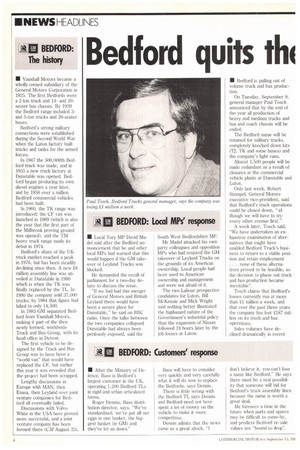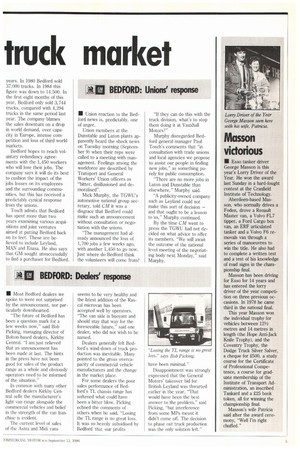Bedford quits du truck market
Page 6

Page 7

If you've noticed an error in this article please click here to report it so we can fix it.
BEDFORD: Local MPS' response
• Local Tory MP David Madel said after the Bedford announcement that he and other local MPs had warned that this would happen if the GM takeover of Leyland Trucks was blocked.
He demanded the recall of parliament for a two-day debate to discuss the issue.
"If we had had this merger of General Motors and British Leyland there would have been a secure place for Dunstable," he said on BBC radio. Once the talks between the two companies collapsed Dunstable had always been perilously exposed, said the South West Bedfordshire MP.
Mr Madel attacked his own party colleagues and opposition MPs who had resisted the GM takeover of Leyland Trucks on the grounds of its American ownership. Local people had been used to American ownership and management and were not afraid of it.
The two Labour prospective candidates for Luton, Bill McKenzie and Mick Wright said nothing better illustrated the haphazard nature of the Government's industrial policy than the expansion of Nissan followed 24 hours later by the job losses at Luton. • Bedford is pulling out of volume truck and bus production.
On Tuesday, September 9, general manager Paul Tosch announced that by the end of the year all production of heavy and medium trucks and bus and coach chassis will be ended.
The Bedford name will be retained for military trucks, completely knocked down kits (TJ, TK and some buses) and the company's light vans.
Almost 1,500 people will be made redundant as a result of closures at the commercial vehicle plants at Dunstable and Luton.
Only last week, Robert Stempel, General Motors executive vice-president, said that Bedford's truck operations could be closed down, "although we will have to try every other avenue first."
A week later, Tosch said, "We have undertaken an exhaustive examination of alternatives that might have enabled Bedford Truck's business to return to a viable position and retain employment . . . none of these alternatives proved to be feasible, so the decision to phase out truck and bus production became inevitable".
Tosch claims that Bedford's losses currently run at more than million a week, and that over the past three years the company has lost 187 million on its truck and bus operations.
Sales volumes have declined dramatically in recent years. In 1980 Bedford sold 37,000 trucks. In 1984 this figure was down to 14,500. In the first eight months of this year, Bedford only sold 3,744 trucks, compared with 4,294 trucks in the same period last year. The company blames the sales downturn on a drop in world demand, over capacity in Europe, intense competition and loss of third world markets.
Bedford hopes to reach voluntary redundancy agreements with the 1,450 workers who will lose their jobs. The company says it will do its best to cushion the impact of the jobs losses on its employees and the surrounding communities, but this has received a predictably cynical response from the unions.
Tosch admits that Bedford has spent more than two years examining various acquisitions and joint ventures aimed at putting Bedford back on its feet. These are believed to include Leyland, MAN and Enasa. He also says that GM sought unsuccessfully to find a purchaser for Bedford.




























































































